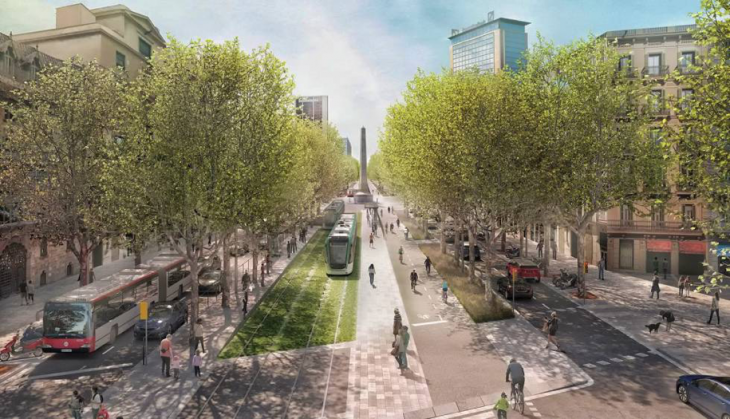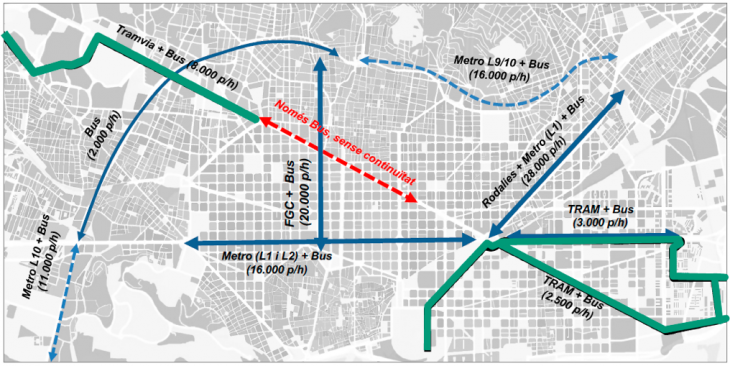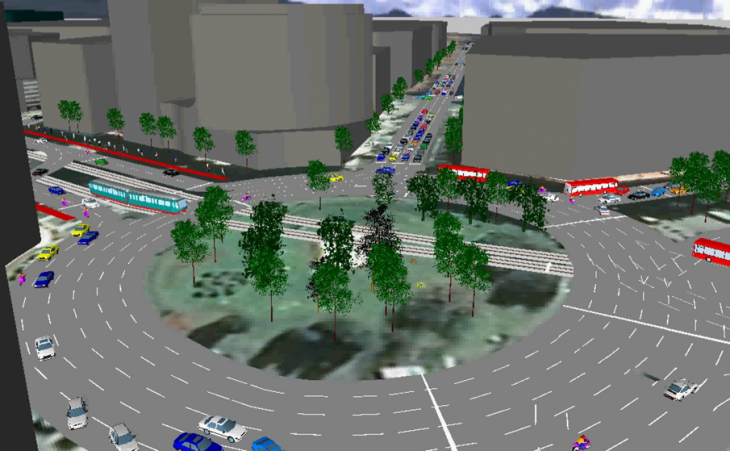Applying engineering analytic methods to assess a major urban transport project: the renewal of the Diagonal Avenue, Barcelona
Faculty: Andreu Ulied, Raquel López, Oriol Biosca, Frederic Lloveras, Efraín Larrea, Marite Guevara from Mcrit and Carles Casamor and Oriol Altisench from Barcelona City Council.
Umbrella: KA-AU (Knowledge Alliance for Advanced Urbanism). Erasmus Programme of the European Union

Background
New social values and emerging energy and communication technologies challenge the way we live and move, as well as the way we plan and design cities.
During the second part of the 20th century, the exponential growth of automobiles and private mobility transformed cities dramatically, and public spaces and transport infrastructures were largely adapted to them. While new urban motorways and bypasses were built, e.g. tramways were removed in many cities in America and Europe.
It is expected that during the coming decades new values (e.g. favouring more collaborative, sharing economies, health and safety concerns, more active citizen participation on urban planning and design…) and new technologies (e.g. fleets of electric/intelligent vehicles managed collectively, smart management of public spaces…) will dramatically change cities, particularly in the more developed world.
It is expected that not only cities will change but the planning and design processes as well.

Image of how the connection could be through the Diagonal ATM, 2017.
Working Process
The target of the seminar is reflecting on these issues through a project of the city of Barcelona: the renewal of the Diagonal Avenue linked to the interconnection of existing tramways. The role of students will be to critically review the proposals already presented by the Local Council, further elaborating their own.
The students will work on their own project proposal while attending to a number of specialist lectures given by engineers working for the Local Council. Following initial presentations of the project delivered by Local Council representatives, urban planning professionals will present and discuss working methodologies and software tools used when designing and assessing the impacts of alternative mobility and urban space solutions, including traffic forecast, micro simulation, cost-benefit socioeconomic assessment and financial assessment of mobility and real estate impacts, and citizen participation and communication approaches. These lectures will always be based on studies carried out in relation to the Diagonal renewal.

Diagonal, the only axis without enough public transportation of high capacity
Technology:
Students will get databases and will use different software tools –mostly GIS and MS EXCEL to carry on analysis and representation.

Example of Microsimulation, Francesc Macià Square Barcelona. Mcrit 2017.
Output
Based on the information gathered from the lectures, students will critically review existing proposals, analyse their likely impacts –social, economic, environmental… develop their own alternative design proposals and be able to compute (e.g. using MS EXCEL macros) Cost-Benefit indicators to assess them.
Course Schedule:
- Tuesday 17th October – Advanced Urbanism: Mobility of the Future / Definition of the studio purposes and working groups / Lecture & Discussion by Andreu Ulied
- Tuesday 24th October at MCRIT (Espriu 83) – Macro and micro traffic simulation models Lab (I) / Lab on micro-simulation (VISSIM) by Frederic Lloveras (Mcrit) / Lab on macro-simulation (Geo-Transportation) by Raquel López (Mcrit)
- Tuesday 31 at MCRIT (Espriu 83) – Macro and micro traffic simulation models Lab (II) / Lab on macro-simulation (VISSUM) by Frederic Lloveras (Mcrit) / Lab on macro-simulation (VISSUM) by Adriana Cavellé (Mcrit)
- Tuesday 7th November – Tramway impact on Barcelona Mobility System / Lecture & Debate by Oriol Altisench (Barcelona City Council. Coordinator of the tramway project)
- Tuesday 14th November at MCRIT (Espriu 83)– Geographic Information Systems Lab / Database management, spreadsheet & Geographic Information Systems by Efrain Larrea (Mcrit), SIG for modelling by Adriana Cavallé (Mcrit)
- Tuesday 21st November – Tramway interconnection’s impact on urban and metropolitan transport’s networks management and regulation plans / Lecture by Lluis Alegre (ATM, Technical Director) Debate by Andreu Ulied
- Tuesday 28th November at MCRIT (Espriu 83) – Social, Economic and Environmental & Financial models Lab / Lab on economic assessment models (XLS) by Oriol Biosca (Mcrit) / Lab on financial assessment models (XLS) by Efraín Larrea (Mcrit)
- Tuesday 5th December – What to take in consideration when giving a technical presentation? / Marité Guevara (Ersilia Foundation)
- Tuesday 12th December – FINAL PRESENTATION BY STUDENTS
- Tuesday 19th December – FINAL DISCUSSION ON ADVANCED URBANISM / Open debate by Vicente Guallart (IaaC) tbc / Andreu Ulied (Mcrit) based
on course readings and student’s design/strategic proposals